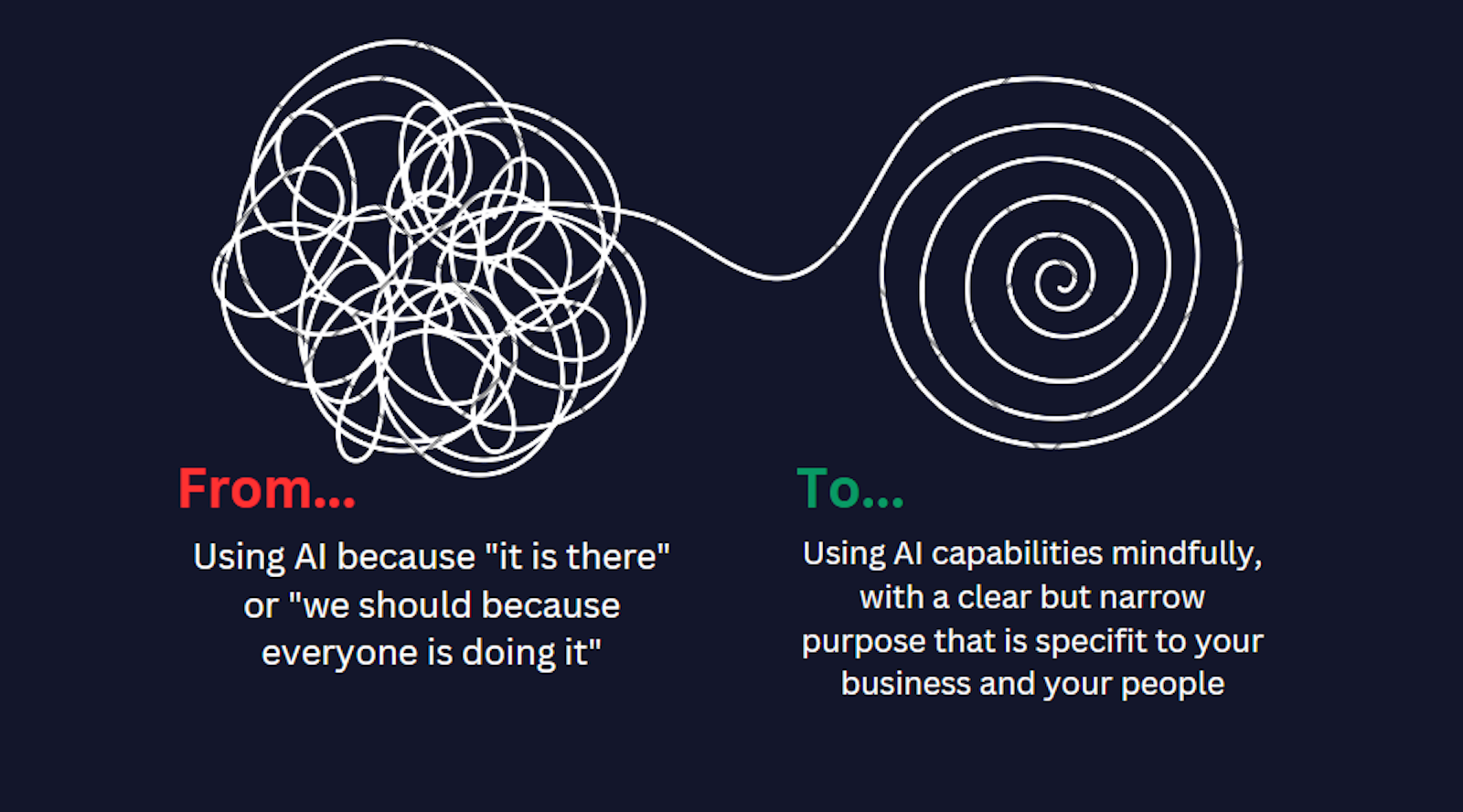

The goal of this blog post is to guide you from simply using AI because "everyone else is doing it" to leveraging AI purposefully and strategically—tailored specifically to meet the needs of your business and your team. Many companies fall into the trap of adopting AI technology without a clear direction, overwhelmed by its vast potential yet lacking a targeted approach.
The aim here is to help you transform from a chaotic, ad-hoc AI approach into one that uses AI mindfully, with a clear focus that aligns with your unique business objectives. By the end of this post, you’ll have a clearer understanding of how to make AI work for you in a purposeful way, cutting through the noise and bringing order and precision to your AI strategy.
Let’s dive into how businesses can make this transition from the chaos of indiscriminate AI adoption to an intentional and efficient approach, and discover what that can mean for productivity, growth, and sustained success.
One of the biggest advantages AI offers is the automation of routine, repetitive tasks. With AI-powered tools, businesses can automate:
By automating these processes, companies can reduce the burden on employees, freeing up time for more strategic and creative work.
Customer experience is a crucial aspect of any business. AI can enhance customer service and personalization in ways that weren’t possible before:
By leveraging AI in customer interactions, businesses can create a more personalized experience that keeps customers engaged and loyal.
AI excels at analyzing large datasets, making it an invaluable tool for data-driven decision-making. AI tools help businesses:
These data insights allow businesses to make smarter, more informed decisions that align with current and future market demands.
In marketing, AI can play a transformative role by helping businesses reach the right audience with the right message at the right time:
By using AI in marketing, businesses can optimize their ad spend and create campaigns that resonate with their target audience.
Security is a top priority for businesses, especially in an increasingly digital world. AI brings advanced security measures to the table:
By utilizing AI for security, companies can better protect their assets, data, and customer information.
AI can play an instrumental role in product development, providing insights into what customers want and predicting trends in consumer behavior. For example:
AI-driven insights allow businesses to innovate faster, improve product quality, and ultimately create offerings that better meet customer needs.
Integrating AI into your business doesn’t have to be an overwhelming process. Here are a few steps to start:
Identify pain points: Focus on areas where AI can solve specific challenges, whether it’s customer service, marketing, or product development.
Choose the right tools: There are countless AI tools available, from simple automation software to complex machine learning platforms. Select tools that align with your business needs and goals.
Start small: Begin with one or two applications of AI to gain confidence and assess the impact. For instance, automating data entry or adding an AI chatbot can yield immediate results without a significant investment.
Train your team: AI should enhance human potential, not replace it. Ensure that your team understands the tools, their purpose, and how they can contribute to overall productivity.
Measure and optimize: Use KPIs to evaluate the effectiveness of your AI applications. Regularly assess performance and make adjustments to maximize impact.
As AI technology becomes more accessible, businesses that embrace it now will have a significant advantage over those that hesitate. By streamlining operations, improving customer experiences, and making data-driven decisions, businesses can harness AI to propel their growth and position themselves for long-term success. Whether your business is large or small, AI can unlock new possibilities, save time, and help you stay competitive in an increasingly digital landscape.
AI can indeed be a game-changer for businesses looking to thrive in the modern economy. When thoughtfully implemented, it’s a tool that can redefine what’s possible, opening doors to efficiency, personalization, and innovation.